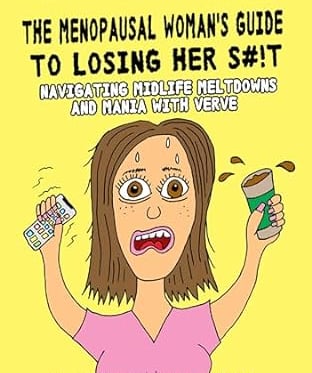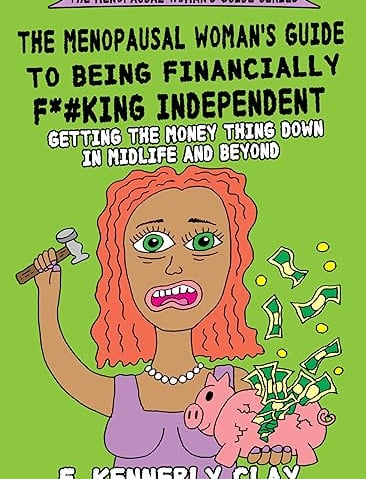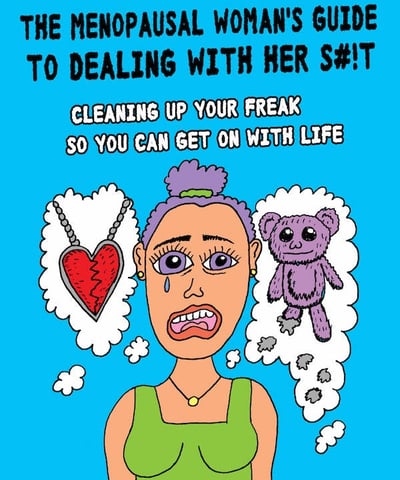Menopause Depression: Here's What Helps
If you're feeling totally blindsided by menopause depression and a slew of symptoms at this stage of life, here are some things we've found that might help.
MENOPAUSAL SYMPTOMSMENOPAUSAL DEPRESSION
Kennerly Clay
6/1/20249 min read
What helps menopause depression?
Dealing with depression in menopause is a bitch. Depression goes way beyond mood swings and may include feelings of despair, hopelessness, lack of interest in daily life, low motivation and energy, and other symptoms. You may not feel like getting out of bed in the morning or maybe you just feel generally disinterested in life.
If menopause and mental health issues resonates for you, it's important to see a mental healthcare provider. Don't do depression alone in menopause. Reaching out for support is the first step in coping with menopause depression. Along with your medical diagnosis and any treatment your provider recommends, you should absolutely seek out alternative treatments and practice self-care to support the medical approach.
If you prefer NOT to seek medical care for treating menopause depression, you may wish to consider alternative therapies, like psychedelic medicine, if it's appropriate for you. This article touches on a variety of mental health options for menopause depression and may stimulate ideas you haven't considered or tried yet.
In my case, I kicked off perimenopause with debilitating fatigue and depressive symptoms, which were somewhat relieved by antidepressants and talk therapy. Over time, however, I fell into existential depression - an overwhelming sense that there was no meaning in life and no reason to keep living.


If you or someone you know is in crisis, please call 988, the Suicide & Crisis Lifeline in the United States.
Medical treatments for menopause depression
Managing menopause-related depression often necessitates a multifaceted medical approach. One primary treatment option is hormone replacement therapy (HRT). Hormone replacement therapy for menopause involves supplementing the body with hormones, most commonly estrogen and sometimes progesterone, to counteract the decreased levels that occur during menopause. This can significantly alleviate symptoms of depression by restoring hormonal balance. And while menopausal depression may feel like it lasts forever, it's quite possible that your depressive symptoms will subside over time - after all the hormonal havoc has been wreaked.
Hormone replacement therapy
There are different types of HRT available. Estrogen therapy, where estrogen is administered alone, is often prescribed for women who have undergone a hysterectomy. Combined estrogen-progesterone therapy is typically recommended for women who still have their uterus, as the addition of progesterone reduces the risk of endometrial cancer that can be heightened by estrogen alone. But it's crucial to be aware of the potential side effects and risks associated with HRT, such as an increased risk of blood clots, stroke, and certain types of cancer.
I opted for bio-identical hormone replacement therapy (BHRT) after reading Suzanne Sommers' book I'm Too Young for This - The Natural Hormone Solution to Enjoy Perimenopause about her perimenopausal journey and discoveries. BHRT also came highly recommended from a friend who introduced me to a local functional and integrative medicine MD. These kinds of doctors are generally more aware of alternative therapies and efficacy.
My doc prescribed a full hormone panel that revealed I had zero free testosterone in my body, meaning I had nothing to support energy, drive and mental focus. It was illuminating! So we started on BHRT - a tiny pellet inserted in my butt cheek like every three or four months. The debilitating fatigue went away. Mental clarity crept back in. I came out of the fog. It was for me. But of course not for everyone. (By the way, the "old" way of thinking about BHRT as unsafe, because not FDA-approved, has slowly been shifting. Do your research. Come to your own conclusions.)
Antidepressants to take the edge off
Another cornerstone in the treatment of menopause-related depression is the use of antidepressants. Selective serotonin reuptake inhibitors (SSRIs) and serotonin-norepinephrine reuptake inhibitors (SNRIs) are commonly prescribed. These medications work by altering the levels of neurotransmitters in the brain, thereby improving mood and alleviating depression. WebMD notes that "SSRIs and SNRIs may also help with menopause symptoms like hot flashes or increased pain." Examples of these antidepressants include fluoxetine (Prozac), sertraline (Zoloft), and venlafaxine (Effexor).
Medical treatments for menopause depression are diverse and should be tailored to your individual needs. Again, work with a trusted healthcare professional to determine the most appropriate course of action, considering both the benefits and potential risks associated with each treatment option. Here's a bright note: Menopause depression is often temporary, only as extreme as the fluctuations of your raging, rebelling, menopausal hormones.
So we started on BHRT - a tiny pellet inserted in my butt cheek like every three or four months. The debilitating fatigue went away. Mental clarity crept back in. I came out of the fog. It was for me.
Non-medical treatments for menopause depression
Non-medical treatments for menopause depression can sometimes be as effective as pharmacological interventions. One of the most impactful strategies is implementing lifestyle changes. Regular physical exercise, such as yoga or Pilates, walking, and strength training, has been shown to elevate mood and alleviate depressive symptoms. The great irony is, of course, that the need for heightened physical activity in menopause often collides with the fact you don't feel like doing jack shit because you're depressed, lethargic, unhappy, dealing with outside stressors, and on and on. Nonetheless, find some simple activity you can do that doesn't require a big production. I found turning on a disco beat in the middle of the day and dancing around my house is a nice little mood-lifter and gift I give to myself.
Health body, healthy mind
In addition to physical activity, maintaining a balanced diet and ensuring adequate sleep are fundamental lifestyle changes for menopause depression. Nutrient-rich foods that are high in omega-3 fatty acids, vitamins, and minerals can support brain health and stabilize mood. A diet low in sugar and refined carbs can also prevent mood swings and energy crashes, which are common during menopause.
Of course, these are all things you have heard before but if you're experiencing depression at this stage of life, it's important to make healthy behavior changes (if you haven't already) and rule out any culprits that could be hindering your access to feeling better mentally. Diet and rest are things you actually have some control over.
Although getting enough sleep is a laugh-out-loud recommendation. Like who the fuck can sleep well during menopause? Yet lack of sleep can really wreak some havoc, on your mental well-being and your physical. If you can't sleep well through the night, find healthy ways to get back to slumbering, like putting on a sleep meditation or listening to a story on audiobook or a podcast that has a soothing narrator's voice to lull you to sleep. During the day, if you're feeling wiped out from no sleep, find a way to take a cat nap or do a short meditation that can help quiet the noise and make you feel like you've had a reprieve. Compensate, in other words, for the broken sleep, by being kind to yourself during the day.
Connection and camaraderie
Social support is another crucial element in managing menopause depression. Engaging with friends, family, or joining support groups can provide emotional stability and a sense of belonging. This social interaction not only offers comfort but also helps in sharing experiences and coping strategies. As noted by the American Psychological Association, “Having a strong support system can significantly improve mental health outcomes for those navigating the challenges of menopause.”
Cognitive-behavioral therapy (CBT) for menopause is a highly effective non-medical approach. CBT focuses on identifying and changing negative thought patterns and behaviors that contribute to depression. This form of therapy has been proven to reduce symptoms of menopause depression by equipping people with coping mechanisms to manage stress and emotional fluctuations. Healthline reports that CBT can be particularly beneficial, as it provides tools to address both the psychological and physical symptoms associated with menopause.
I wouldn't go through menopause without a therapist! That's just me, of course, but chances are you're dealing with way more shit in your life than hot flashes and angry outbursts at your family. A good therapist can be the person who gets you - every ounce of you - during this time of emotional upheaval, which could well include unresolved past issues that need to be worked out. Menopause is a great time to work on yourself because you really are moving into a new chapter in life. And you're the author of it, of course, so what do you want to write?
Overall, non-medical treatments such as lifestyle changes, social support, and cognitive-behavioral therapy for menopause depression offer comprehensive strategies to improve mental well-being. These approaches form a holistic framework for managing menopause depression effectively.
Holistic approaches and natural remedies
Managing menopause depression through holistic approaches and natural remedies has gained significant attention and much greater acceptance in recent years. Many women seek alternatives to conventional medications, aiming for solutions that align with a more natural lifestyle. Herbal supplements, including St. John's Wort, black cohosh, and omega-3 fatty acids, are frequently discussed in this context.
St. John's Wort is often highlighted for its potential antidepressant effects. According to the National Center for Complementary and Integrative Health (NCCIH), some studies suggest that St. John's Wort may help alleviate mild to moderate depression, although it also notes the importance of consulting healthcare providers due to potential interactions with other medications. Black cohosh is another herb traditionally used to manage menopause symptoms, including mood swings and hot flashes. However, the NCCIH advises caution, as the evidence on its effectiveness is mixed, and long-term safety remains uncertain.
Omega-3 fatty acids, commonly found in fish oil, are recognized for their role in brain health and mood regulation. Research indicates that omega-3s might help reduce depressive symptoms, making them a valuable addition to holistic approaches to menopause. A study published in the Journal of Clinical Psychiatry found that omega-3 supplements could benefit those with major depressive disorder, suggesting potential applicability for menopause-related depression. Omega-3s are also good for your brain so if you're struggling with mental acuity or concerns about memory loss, consider adding more of this into your diet or opt for supplementation.
In addition to herbal supplements, alternative therapies play a crucial role in managing menopause depression. Acupuncture, for instance, has been shown to alleviate symptoms of depression and anxiety. The NCCIH highlights several studies that demonstrate acupuncture's efficacy in improving mental health conditions. Some health insurance providers now offer coverage for a certain number of acupuncture treatments annually. Check your insurance to see what your options might be. Aromatherapy, utilizing essential oils like lavender and chamomile, is free, of course, and can also promote relaxation and reduce stress levels.
Mindfulness meditation is another powerful tool in holistic approaches to menopause. By focusing on present-moment awareness, mindfulness can help manage emotional responses and reduce the impact of stress. A study in the Journal of Clinical Psychology found that mindfulness-based interventions significantly reduced symptoms of depression and anxiety.
Experimenting with CBD
Cannabidiol (CBD), a non-psychoactive compound found in cannabis, shows promise in treating menopause-related depression. CBD interacts with the endocannabinoid system, which regulates mood, stress, and emotional responses. Studies suggest that CBD has anxiolytic and antidepressant properties, potentially alleviating symptoms of menopause-induced depression. Additionally, CBD may improve sleep quality and reduce inflammation, which can further enhance overall well-being during menopause. However, more extensive clinical research is needed to fully understand CBD's efficacy and safety in this context, ensuring it can be a reliable treatment option.
What about ketamine therapy for menopause depression?
Ketamine therapy for depression has gained ground in recent years, since the legalization of the treatment for in-home as well as ketamine therapy treatment centers. Ketamine may be recommended for people with treatment-resistant depression, meaning you've tried a variety of antidepressants, talk therapy and other treatment approaches, but nothing seems to be working. Ketamine may be able to access realms of your psyche (and your spirit) that traditional treatments can't touch.
My personal experience was with Mindbloom in-home ketamine treatments overseen by a clinical psychologist and supported by a "guide." You can read more about my journey with psychedelic medicine and depression or explore my blog where I share about every stage of my ketamine treatment and how the drug shifted my reality over time. I consider myself "depression-free" at time of writing, although I do take a small daily dose of Wellbutrin.
Overall, a holistic approach that considers the mind-body connection is essential for managing menopause depression. Integrating natural remedies for menopause depression with alternative therapies can promote overall well-being and enhance quality of life during this transitional phase.
Wanna talk more about depression in menopause?
Books for women who are losing it in menopause
Mental Health
Losing your mind in peri/menopause?
The menopausal woman's guide series
Financial Health
Had enough of financial insanity?
Personal Growth
Triggers? Old stuff kicking up?
Related topics
Explore helpful articles, tips, and advice for women who are losing their shit in menopause.
Community
Stay Connected
© 2024. Eclectic Content, Inc. All rights reserved.






